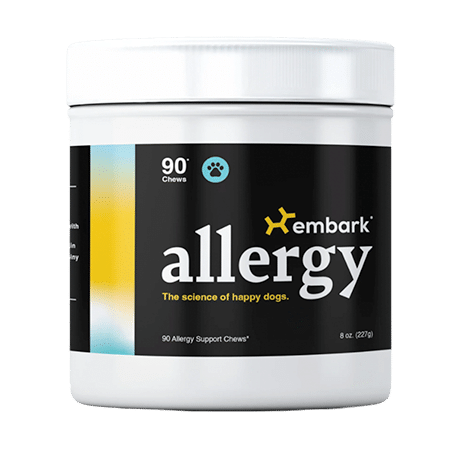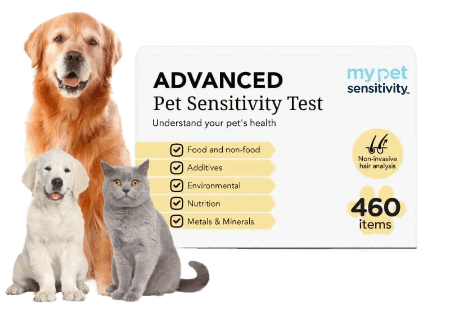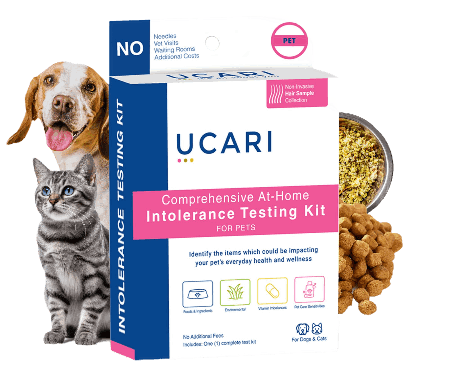
Reviewed by Dr. Joseph Menicucci, DVM, MBA. Veterinary Health Specialist and Diagnostic Expert.
Your First Step Towards a Happier, Healthier Pet:
Introduction to Pet Sensitivities and Allergies
Have you noticed your dog displaying unusual symptoms like excessive sneezing or skin rashes? Understanding whether these are signs of allergies or sensitivities is crucial. Recognizing these early signs is the first step in providing the best care for your pet.
Discover the Best Solutions for Dog's Allergies
While we're about to explore the common signs and intricacies of dog allergies, we understand that some of you might be steps ahead, seeking immediate solutions. For those eager to find the best allergy test kits for your beloved pets, feel free to check out our carefully curated list of the best dog allergy test kits. This resource is designed to help you make informed decisions quickly, ensuring the best care for your canine companion.
- 1000+ Intolerances & Imbalances Tested
- Actionable Nutritional Insights
- Results in 2 Days From Sample Receive
- 10-15 Hair Samples
- 550 Foods+Additives & Enviro Tested
- 100% Money-back Guarantee Offered
- Results in 3-5 Days for Pet Comfort
- 5-10 Hair Samples
- Tests 380 Pet Food & Environment Items
- Guides Diet & Environment Changes
- Results 5-7 Days After Receipt
- 10-15 Hair Samples
Allergies vs. Sensitivities and Intolerances
Distinguishing between allergies, sensitivities, and intolerances is crucial for your dog’s health. Each condition affects your dog differently and requires unique management and treatment.
Allergies
Allergies in dogs involve an immune system response to an allergen, usually a protein. Symptoms include itching, inflamed skin, vomiting, and diarrhea. Allergies are less common but more severe due to immune involvement. They can also be triggered by environmental factors like pollen and mold.
Remember, allergy testing is a veterinarian’s task.
Sensitivities and Intolerances
Sensitivities and intolerances do not involve the immune system. They are generally related to the digestive system's inability to process certain foods, causing symptoms like loose stools, gas, and stomach pain. These conditions are common and often confused with allergies.
Why the Confusion?
Many pet owners mistakenly seek allergy tests for conditions that are actually sensitivities or intolerances. We use the term “allergy test” to guide owners to the appropriate tests. However, diagnosing allergies is a veterinarian's job. Always consult a vet for accurate diagnosis and treatment.
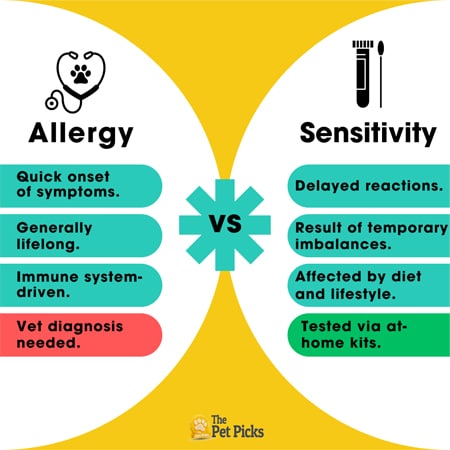
Common Signs of Pet Sensitivities: Recognizing the Red Flags
Pet allergies and sensitivities can greatly affect your dog's health. Early recognition of symptoms is essential for effective care. Here are the most common signs:
-
- Skin Problems: Visible issues like rashes, redness, hot spots, or scabs.
-
- Excessive Itching: Constant scratching, possibly causing skin damage.
-
- Digestive Issues: Symptoms like vomiting, diarrhea, or stomach noises, indicating possible food allergies or intolerances.
-
- Respiratory Signs: Frequent sneezing or runny nose, similar to human allergy symptoms.
-
- Food Reactions: Specific allergies, such as adverse reactions to chicken, causing gastrointestinal or skin issues.
-
- Ear Infections: Regular infections, often with head shaking or ear pawing.
-
- Paw Licking/Chewing: Excessive due to food or environmental allergies.
-
- Eye Discharge: Watery or itchy eyes with noticeable discharge or redness.
-
- Seasonal Symptoms: Increased itching or respiratory issues during certain seasons.
-
- Behavior Changes: Lethargy, irritability, or sleep disturbances due to discomfort.
Early detection of these signs, like puppy itching or skin irritation, is vital. If observed, consider a pet allergy test to identify triggers and improve your dog's quality of life.
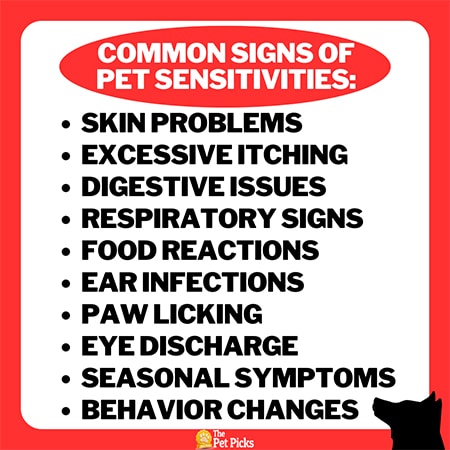
Help Support Seasonal Allergies
Embark's Allergy Supplement is a great choice for dogs with sensitive skin or for pet parents who want to keep their dog’s coat shiny and smooth. These vet-formulated, all-natural bacon-flavored soft chews are designed to help support seasonal allergies. Embark Allergy helps maintain the normal skin barrier’s moisture and function. This supplement may also help soothe skin issues associated with seasonal allergies.
*Always consult your veterinarian before adding any supplement to your dog's routine.
Dog Allergy Test: The Solution for Your Dog's Sensitivities
Pet allergy tests offer a straightforward, non-invasive, and convenient method to uncover your dog's unique sensitivities and allergies. These tests, which typically require a small sample of your dog's fur or hair, are adept at identifying a wide range of sensitivities, including:
-
- Food Sensitivities: The tests can pinpoint sensitivities to various food items, such as different proteins, grains, dairy products, and additives. This is especially important for dogs showing signs of food allergies or intolerances, manifesting as digestive issues or skin irritations.
-
- Environmental Allergens: Additionally, these tests screen for reactions to environmental factors like pollen, dust mites, molds, and certain fabrics. This is particularly useful for dogs that exhibit symptoms of seasonal allergies or react to specific elements in their environment.
-
- Non-Food Items: Some tests go a step further, assessing sensitivities to non-food materials such as plastics, chemicals, and metals. This can be crucial for dogs experiencing unexplained allergic reactions.
-
- Nutritional Analysis: A few tests also provide insights into your dog's nutritional needs, identifying potential dietary deficiencies or excesses.
These pet allergy tests are designed to be as non-invasive as possible, requiring only a small sample from your dog. By accurately determining the causes of symptoms like excessive itching, sneezing, or skin rashes, these tests enable you to make informed decisions about your dog's diet, environment, and overall care. This leads to an improved quality of life for your furry friend, ensuring they stay happy and healthy.
The Basics Behind Dog Allergy Testing
The science of pet sensitivity testing has made significant strides,offering easy and non-invasive ways to understand your pet’s health needs. Most tests require just a small hair or saliva sample and can provide insights into various sensitivities. These tests can cover a wide range of substances, including various food items, environmental factors, and even nutritional imbalances.
Benefits of Knowing Your Pet’s Sensitivities
-
- Improved Health: Understanding sensitivities prevents symptoms like digestive issues and skin problems, enhancing your pet's health.
-
- Better Well-being: Knowledge of sensitivities informs diet and environment choices, reducing discomfort and boosting overall well-being.
-
- Proactive Care: Testing can uncover hidden issues for early intervention, even without visible symptoms.
-
- Tailored Care: Personalized test results allow for customized diet and care, promoting a healthier life for your pet.
-
- Detecting Hidden Discomfort: Identifies internal issues like joint or stomach pain, addressing non-visible symptoms.
-
- Ease and Convenience: Modern, non-invasive tests, often needing just a hair sample, make monitoring sensitivities straightforward.
-
- Guided Improvement: Test results provide clear steps to reduce or avoid sensitivities, improving your pet's lifestyle.
- Guided Improvement: Test results provide clear steps to reduce or avoid sensitivities, improving your pet's lifestyle.
Step-by-Step Guide to Dog Allergy Testing
-
- Selecting a Test Kit: Choose a pet sensitivity test kit from the best pet allergy & intolerance test kits
- Selecting a Test Kit: Choose a pet sensitivity test kit from the best pet allergy & intolerance test kits
-
- Sample Collection: Collect a small hair sample from your pet, usually 10-15 strands, or a saliva sample, depending on the test's requirements.
-
- Send the Sample: Place the hair or saliva in the provided container and use the prepaid return method to send it to the testing company.
-
- Wait for Results: Analysis can take 2-6 weeks. The company will test for various sensitivities and intolerances.
-
- Review Results: You'll receive a detailed report via email or on the company's website, showing your pet's sensitivities with clear indications of severity.
-
- Consult and Plan: Some companies offer expert consultations to help interpret the results and suggest dietary or environmental changes.
-
- Follow-Up: A subsequent test may be recommended to assess the effectiveness of any changes made.
Comparing the Best Dog Allergy Tests
Choosing the right allergy test for your dog can be overwhelming with so many options available. To help you make an informed decision, we've compared the best dog allergy tests on the market. Our comprehensive comparison covers various aspects, including accuracy, ease of use, and the type of information provided by each test. For a detailed look at our top picks and to find the best fit for your furry friend, visit our dedicated landing page: Best Dog Allergy Test Kits.
Comprehensive Management Strategies for Managing Your Pet's Sensitivities
After identifying your pet's sensitivities through testing, a holistic approach can significantly enhance their quality of life. This section dives into effective management strategies that encompass dietary adjustments, environmental controls, and medical treatments.
Dietary Adjustments
For dogs with food sensitivities or intolerances, the implementation of a special diet is crucial. Consider introducing hypoallergenic diets or using novel protein sources; these are specially formulated so that proteins are broken down into smaller fragments, which reduces the likelihood of immune system detection and reaction. Ensure that the diet is strictly adhered to for the recommended period, usually at least 8-10 weeks, to accurately assess its efficacy in alleviating symptoms. It is important to always consult your veterinarian regarding dietary adjustments to ensure they are suitable and safe for your pet's specific health needs.
Environmental Control
Reducing exposure to environmental allergens can be equally important. Regular cleaning to remove dust and dander, using air purifiers to filter out allergens, and keeping your home free from smoke and chemical sprays can help manage environmental sensitivities. Additionally, during high pollen seasons, limit your pet's outdoor activities and consider wiping their coat with a wet cloth after walks to remove pollen and other allergens.
Medical Treatments
While dietary and environmental management are fundamental, some cases may require medical intervention. Discuss with your vet the possibility of using medications such as antihistamines or corticosteroids to manage severe symptoms effectively. Non-invasive options like omega fatty acid supplements might also be recommended to support skin health and reduce inflammation. Always consult with a veterinarian before starting any new medication to ensure it's suitable for your pet's specific condition.
Follow-Up Care
Regular follow-ups with your veterinarian are essential to monitor your pet's progress and make any necessary adjustments to their management plan. This may include adjusting their diet, modifying environmental controls, or altering their medication regimen based on their response to treatment.
By integrating these strategies into your pet's care routine, you can help manage their sensitivities more effectively and improve their overall well-being. Remember, each pet is unique, so these strategies should be tailored to fit their specific needs as identified through sensitivity testing and veterinary consultations.
What to Expect During Your Dog’s Allergy Diagnosis: A Vet's Step-by-Step Approach
Understanding the diagnostic process used by veterinarians to identify the underlying causes of allergies, sensitivities, and intolerances can help pet owners know what to expect during a veterinary visit. This is an overview of the typical diagnostic steps:
Initial Evaluation
The diagnostic journey typically begins with a detailed history and a thorough physical examination, focusing particularly on dermatologic signs. Veterinarians look for specific symptoms such as pruritus (itchiness), which is often the primary indication of a food allergy. This itchiness is usually non-seasonal and may be localized to areas like the face, ears, legs, and abdomen.
Dermatologic Diagnostics
Following the initial evaluation, a range of dermatologic diagnostic tests might be conducted. These can include superficial and deep skin scrapings to check for parasites, impression smears for microscopic examination of cells, and fungal cultures if a dermatophytosis (ringworm) is suspected. An otoscopic examination is also common, especially if there are signs of ear infections, which are frequently associated with food allergies.
Gastrointestinal Diagnostics
For dogs presenting with gastrointestinal symptoms like vomiting or diarrhea—which can also be indicative of food allergies—additional diagnostics may include a complete blood count, serum biochemical profile, urinalysis, and fecal analysis. Imaging studies such as abdominal radiography or ultrasound may also be employed to rule out other causes.
Food Trials
One of the definitive methods for diagnosing food allergies is through food trials. This involves feeding the dog an elimination diet that excludes any potential allergens for a period, typically around 8-10 weeks, and observing whether symptoms improve. If symptoms do resolve, the original diet or specific foods are reintroduced to confirm which causes reactions. This method helps to clearly identify dietary triggers.
These diagnostic steps are critical for effectively identifying and managing food allergies, sensitivities, and intolerances in dogs, allowing for tailored treatment plans that improve the quality of life for affected pets.
By opting for a sensitivity test, you can accurately pinpoint your dog's specific sensitivities, ensuring a targeted approach to managing their health. This testing can identify both food-related and environmental triggers, allowing you to make informed decisions about their diet and surroundings, thus enhancing their quality of life.
Furry FAQs:
What are the most common signs of allergies in dogs?
Common signs of allergies in dogs include excessive itching, skin rash, sneezing, and digestive issues. These symptoms can indicate various types of allergies, such as food sensitivities or environmental allergies.
How can I differentiate between food intolerance and food allergy in dogs?
Food intolerance in dogs typically manifests as gastrointestinal symptoms like vomiting or diarrhea. In contrast, food allergies can cause a range of symptoms, including skin irritation, itching, and respiratory issues.
Are there effective treatments for dog allergies?
Yes, there are various treatments for dog allergies, depending on the type and severity. These can include dietary modifications for food allergies, antihistamines, corticosteroids, or other medications for environmental allergies, and lifestyle changes to reduce exposure to allergens.
Can dog allergies lead to more serious health issues?
Untreated allergies in dogs can lead to secondary infections, such as skin infections or ear infections, and can contribute to chronic health problems over time.
What should I consider when choosing a dog allergy test?
When selecting a dog allergy test, consider tests that assess a broad range of potential allergens. This includes various food items, like common proteins that might cause reactions (e.g., chicken), and environmental allergens, to ensure a comprehensive evaluation of potential sensitivities.
Can puppies be tested for allergies?
Yes, puppies can be tested for allergies. However, it's important to note that some allergies may develop or change as the dog matures, so ongoing observation and possibly retesting in the future might be necessary.
Can diet changes alone manage dog food allergies?
Diet changes can be a crucial part of managing food allergies in dogs. Eliminating the offending allergen from the diet is often necessary, but it's important to ensure that the new diet is nutritionally balanced.
What is the Cost of a Dog Allergy Test?
The price of dog allergy tests ranging from $50 to $212. This variation in cost often depends on the test's comprehensiveness and the company's reputation. Keep in mind that prices may change, and companies frequently offer discounts and promotions, which can be a great opportunity to save. The cost is usually indicative of the test's detail and accuracy, so it's essential to balance your budget with your requirements for a thorough and reliable allergy assessment for your dog.
A Loving Reminder
The information provided at ThePetPicks.com is based on research and expertise, aiming to enhance the bond between you and your dog. However, it’s essential to remember that every dog is unique. Always consult with professionals, like veterinarians or trainers, for specific concerns or advice. At ThePetPicks.com, we believe in “Trust Born from Love,” and we encourage every pet parent to make informed decisions rooted in love and care.





